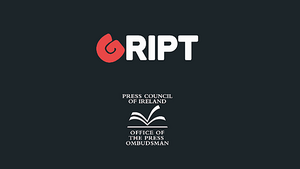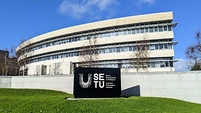Gript granted permission to challenge Press Council decision on DCU article

High Court reporters
Online news outlet Gript has been granted permission by the High Court to challenge the Press Council's decision to uphold an earlier finding that an article entitled "Inside the DCU SPHE Course - Fisting, writing sex scenes, porn terms examined" had breached codes of journalistic practice.
The High Court this morning, granted permission to Gript Media Limited, Gardiner Place, Dublin 1, to challenge the June 2025 decision of the Press Council upholding a previous decision of the Press Ombudsman regarding codes of practice.
The Press Ombudsman found that Gript provided "no evidence that DCU gave adult teachers to understand that sexually explicit exercises used during their training were to be replicated in school classrooms".
"Adaptation of material so that it is age appropriate is not replication and to suggest otherwise, as the publication does, is distortion," it found.
Gript is seeking the quashing of the Press Council's decision and a re-hearing of its appeal on grounds that the regulatory body failed to provide sufficient reasons for its decision.
Gript claims the Press Council erred in applying the incorrect standard of review in assessing the Press Ombudsman's original decision.
Gript further claims it was denied the right to be heard at an oral hearing and was therefore denied a right to fair procedure.
The DCU SPHE/RSE course is a graduate diploma for teachers in Social, Personal and Health Education and Relationships and Sexuality Education, which DCU's website describes as "the first of its kind in an Irish context".
DCU said the course is to assist teachers in helping children and young people in "what can be an incredibly challenging" time in their lives regarding mental health, consent, sexuality, respect and relationships.
The government-funded one-year course is described as "a programme of teacher professional development, specifically designed to upskill and enable registered post-primary teachers to acquire, develop and advance their core competencies in the teaching of SPHE/RSE at Junior and Senior Cycle levels".
In papers lodged to the High Court, Gript submits that the article, "Photos: Inside the DCU SPHE Course - Fisting, writing scenes, porn terms examined", was published on October 4, 2024, on "foot of a video that went viral".
Gript claims that the article outlined the content and context of the video, the responses by then Minister for Education Norma Foley and the funding backdrop for the course.
DCU's complaints that the article allegedly breached the principles of truth and accuracy, fair procedures and honesty and the right to privacy were upheld.
Gript says DCU released a public statement on 23 October, 2024, stating that the video used "completely misrepresented the course" and that there had been associated "disinformation" surrounding it, leading to "threats of violence and misogynistic and homophobic slurs" against academic staff who teach the course.
DCU course participants
The next day, 24 October, 2024, Gript published another article, titled 'Audio: DCU course participants discuss talking "fisting" with students'.
Gript says the story outlined a dispute between a teacher who attended the course and Minister Foley as to the content to be taught in SPHE classes.
"The article quotes multiple sources as to their impression of the course content and its use, versus what Minister Norma Foley and the Department of Education stated", claims Gript.
The company is taking the challenge against regulatory body The Press Council, while the Press Ombudsman and Dublin City University (DCU) are listed as notice parties.
Gript says its articles discussed testimonies from teachers who attended the course and what they perceived of the course's applicability to classrooms, featured course content provided by an attending teacher and outlined the official stance of the Department of Education on the course as well as that of the Association of Secondary Teachers of Ireland.
Gript says that DCU wrote a letter of complaint about a number of their articles on the subject, including other stories titled "Government seeks to make your kids sexperts. That's wrong", "On DCU's SPHE Course: Prof who challenges "children's presumed sexual innocence" and "SPHE: The Irish sex-educators challenging the idea of children's innocence".
At the High Court today, Gript was represented by Maura McNally SC and Conor Rock BL, instructed by Robinsons Solicitors. Counsel successfully applied to Ms Justice Mary Rose Gearty for permission to challenge the Press Council's refusal of Gript's appeal, which claims the applicant was given "insufficient reasons" in the decision being upheld.
Ms Justice Gearty adjourned the matter to November.






